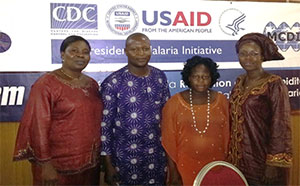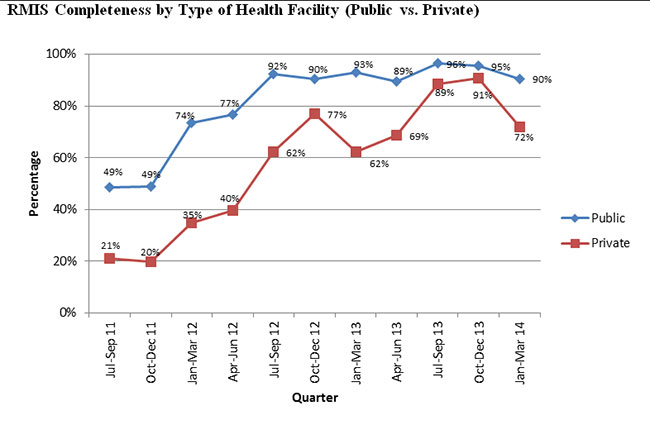
The highest performing statisticians are recognized by their colleagues from the Direction Départementale de la Santé (DDS) and the National Malaria Control Program at a Regional RMIS Data Validation Workshop in Porto Novo, Benin. Credit: ARM3
Before the onset of technical support from the President’s Malaria Initiative (PMI) in 2011, the Routine Malaria Information System (RMIS) in Benin was weak. Data forms at health centers were not regularly transmitted to the health zones, and health facility workers in charge of data collection and reporting were not motivated. Moreover, health zones and regional statisticians were not trained on data management software; the private sector was not involved; and databases and computers were not routinely maintained. All these factors contributed to the lack of relevant, reliable, and appropriate data for decision-making in malaria in Benin. Following PMI’s technical support to the National Malaria Control Program (NMCP), including the Monitoring and Evaluation (M&E) unit and Health Management Information System (HMIS) at the national, regional and peripheral levels, the RMIS situation markedly improved.
In FY 2014, PMI supported the training of 137 statisticians from local to national levels on data reporting and quality control assurance (based on PMI and Roll Back Malaria standards). Additionally, quarterly supervision and routine data quality assessments were conducted nationwide, which were important in ensuring data quality, increasing data appropriateness, and improving the use of data for decision-making by health zone coordinators. Since 2011, monthly RMIS data reporting has increased from 49 percent to 90 percent among government health facilities and from 21 percent to 72 percent among registered private sector facilities.
Dr. Fatembo Hypocrate, the Medical Coordinator for the Dassa-Glazoué Health Zone, said: “With technical and financial support from PMI, the Malaria Outbreak Response Unit has been trained on malaria case management and data collection, which has allowed us to identify gaps in malaria diagnosis and treatment and to address them. As a result, I am regularly updated with timely data on the epidemiological situation of malaria and other diseases in my health zone. Through analysis of accurate data, we have been able to stop malaria outbreaks from spreading.”
This positive feedback was echoed by Mr. Alowah Remi, a statistician at the Lokossa Health Zone, who commented: “As a result of PMI trainings, I now understand the data management process and can easily train health facility medical personnel on data collection. In my Health Zone, this has contributed significantly to the improvement of data quality.”

